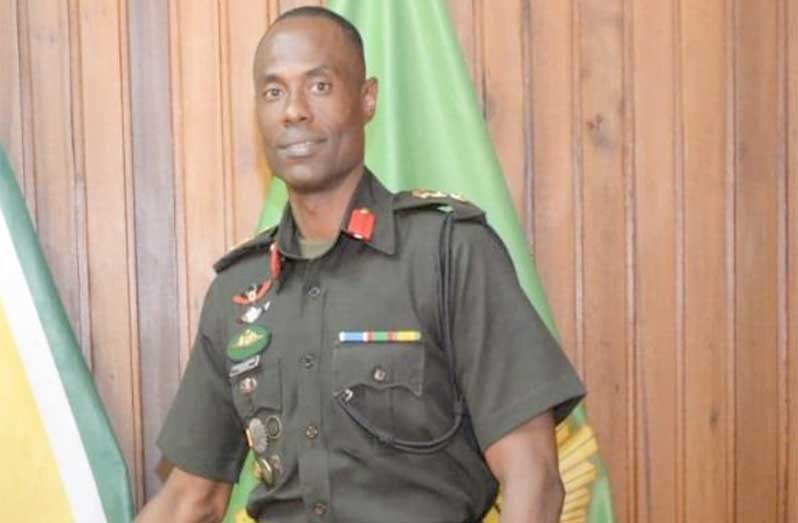NATIONAL security in Guyana is evolving rapidly, and according to Colonel Sheldon Howell, Director of the National Intelligence and Security Agency (NISA), every citizen plays a vital role in safeguarding the nation’s people, resources, and sovereignty.
In Episode 4 of Safeguarding Our Nation, Colonel Howell offered a comprehensive overview of Guyana’s national security architecture and how it is designed to respond to modern threats.
He explained that the country’s security framework is built on collaboration, technology, and, most importantly, public trust.
“National security protects our people, our land, and our way of life,” Howell stated.
He explained that the national security framework brings together all arms of government, including the Guyana Defence Force (GDF), Guyana Police Force (GPF), the Customs Anti-Narcotic Unit (CANU), the Guyana Revenue Authority (GRA), the Fire Service, the Prison Service, the Special Organised Crime Unit (SOCU), and NISA.
Crucially, he emphasised that citizens are at the centre of this security system.
“At the heart of this architecture is you — the citizens,” he said.
“Whether you are a farmer, a business owner, taking your child to school, or part of an Indigenous community, you are part of our national security network.”
Guyana is increasingly relying on sophisticated technology to address emerging threats.
Colonel Howell outlined the use of tools such as drones, advanced cameras, satellite imagery, artificial intelligence (AI), and integrated data platforms to monitor and respond to incidents on land, in the air, at sea, and across cyberspace.
“These tools allow us to respond quickly to threats,” he said. “NISA collects the data, processes it, and shares it with both local agencies and international partners, including the United States, United Kingdom, Brazil, France, and nations across the Caribbean and Latin America.”
This coordinated approach has already produced significant results. Howell cited a specific case in Region Nine where drones detected illegal airstrips and mining camps.
“Drones spotted illegal airstrips and mining camps deep in Region Nine. We were able to deploy teams quickly to shut down those operations, thanks to community information as well as aerial surveillance,” he noted.
He also referenced an incident involving unauthorised Venezuelan vessels entering Guyana’s waters.
“We have radar systems and coastal surveillance, along with Global Positioning System (GPS) tap patrol, that let us intercept these vessels to protect our territory,” Howell explained.
While technology is important, Howell said Guyana is equally focused on developing human resources to ensure sustainable security. He pointed to the establishment of the National Defence Institute (NDI) as a step in the right direction.
“We are investing in human capital development,” he said. “The institute brings together military personnel, academics, the private sector, civil society groups, and Caribbean nations to understand shared threats and help shape new policies and strategies.”
Guyana’s national security measures, he noted, are not limited to border protection. In urban areas like Georgetown, traffic violations and criminal investigations are being aided by closed-circuit television (CCTV) and e-ticketing systems.
According to him, in the hinterland, cross-border tracking technologies are used to monitor the movement of individuals, which can help identify and prevent potential threats.
“At the centre of our response system is the command centre,” Howell added. “It connects the dots and helps us to respond in real time. You may not always see the work being done, but work is being done behind the scene to keep our people and country safe.”
Howell acknowledged that increased surveillance can raise concerns about privacy. He reassured the public that NISA and its partners operate within strict legal boundaries.
“This is a valid concern, even for me,” he admitted. “We don’t want to take away anyone’s freedom; we want to protect it.”
He said all surveillance equipment is logged and audited. Access to footage is strictly monitored and traceable, with oversight mechanisms in place to prevent misuse.
“There is no access to footage without traceability,” he said. “We are also in the process of establishing an oversight board that includes voices from civil society.”
One of the newest developments in Guyana’s national security strategy is an enhanced response system for missing persons, particularly children. Colonel Howell revealed that a national alert system will soon be launched.
“This system will send real-time information to mobile phones, televisions, radios, and social media platforms,” he said. “It will significantly improve how quickly we can respond when someone goes missing.”
Colonel Howell closed his address with a call for continued public co-operation.
He stressed that technology and laws alone cannot ensure safety; national security depends on the trust and participation of the population.
“These tools are not a threat when used with discipline and purpose,” he said. “We are committed to earning and maintaining the public’s trust.”
Whether living in the capital or a remote hinterland village, every Guyanese citizen, the NISA director reiterated, has a role to play in safeguarding the nation.




.jpg)










